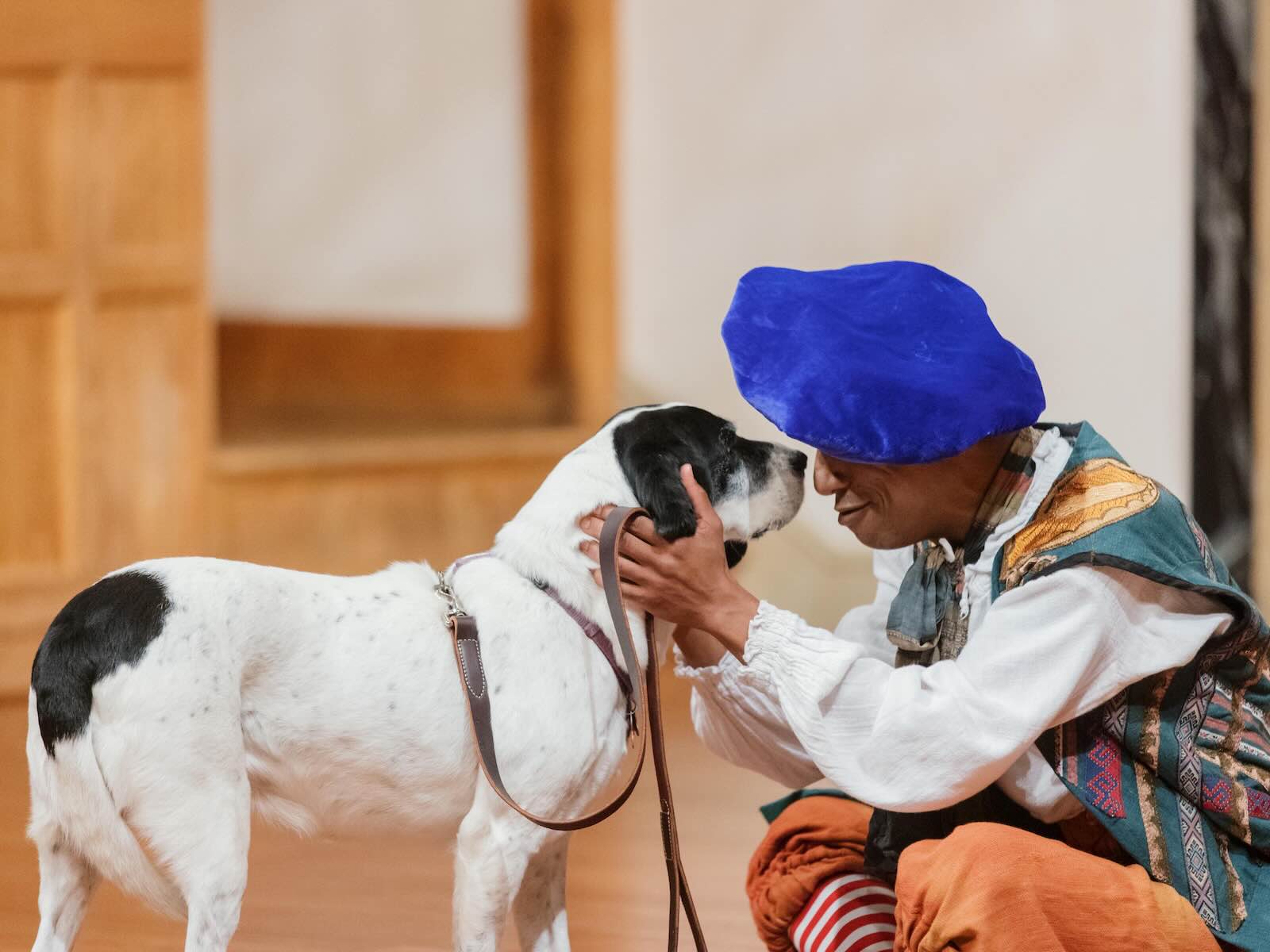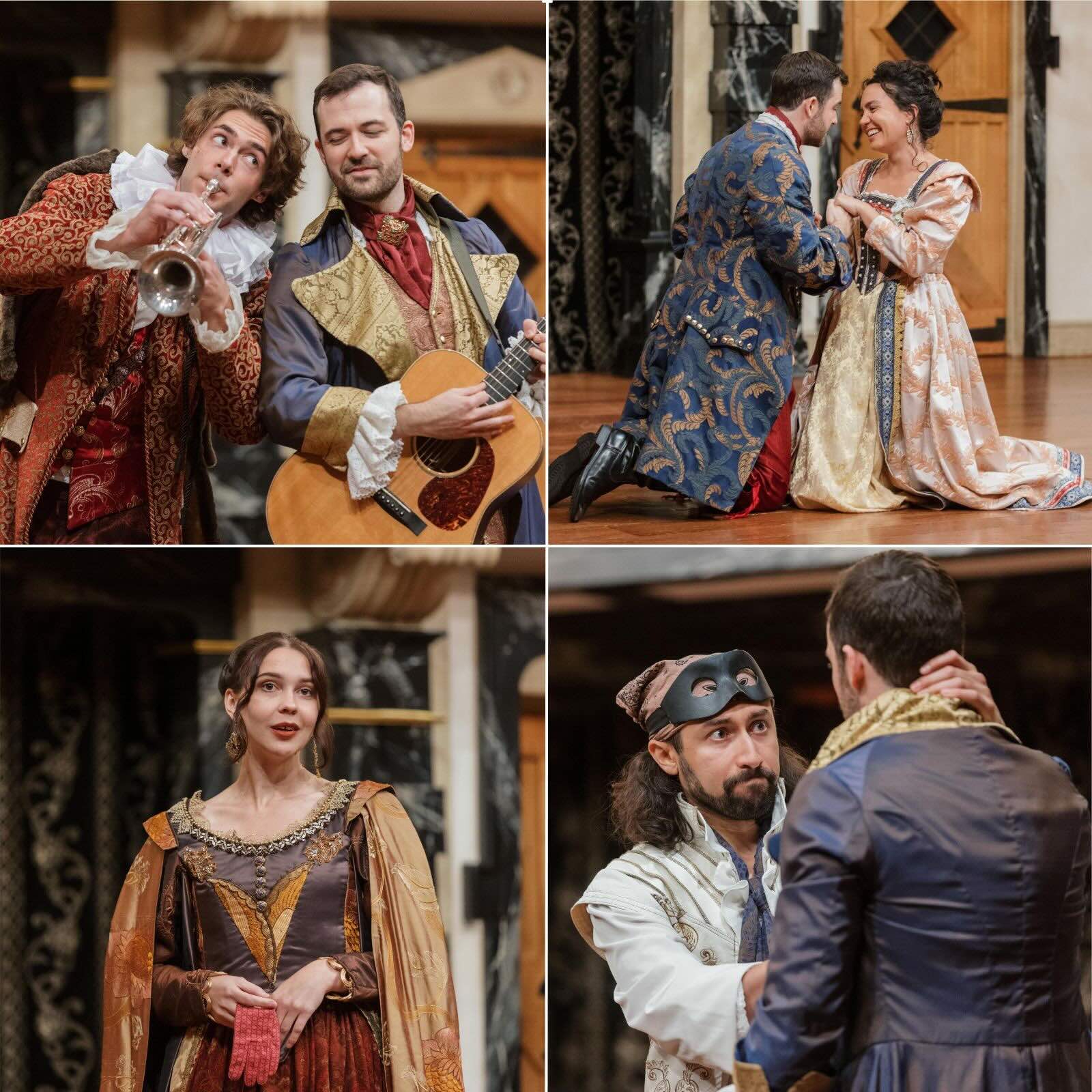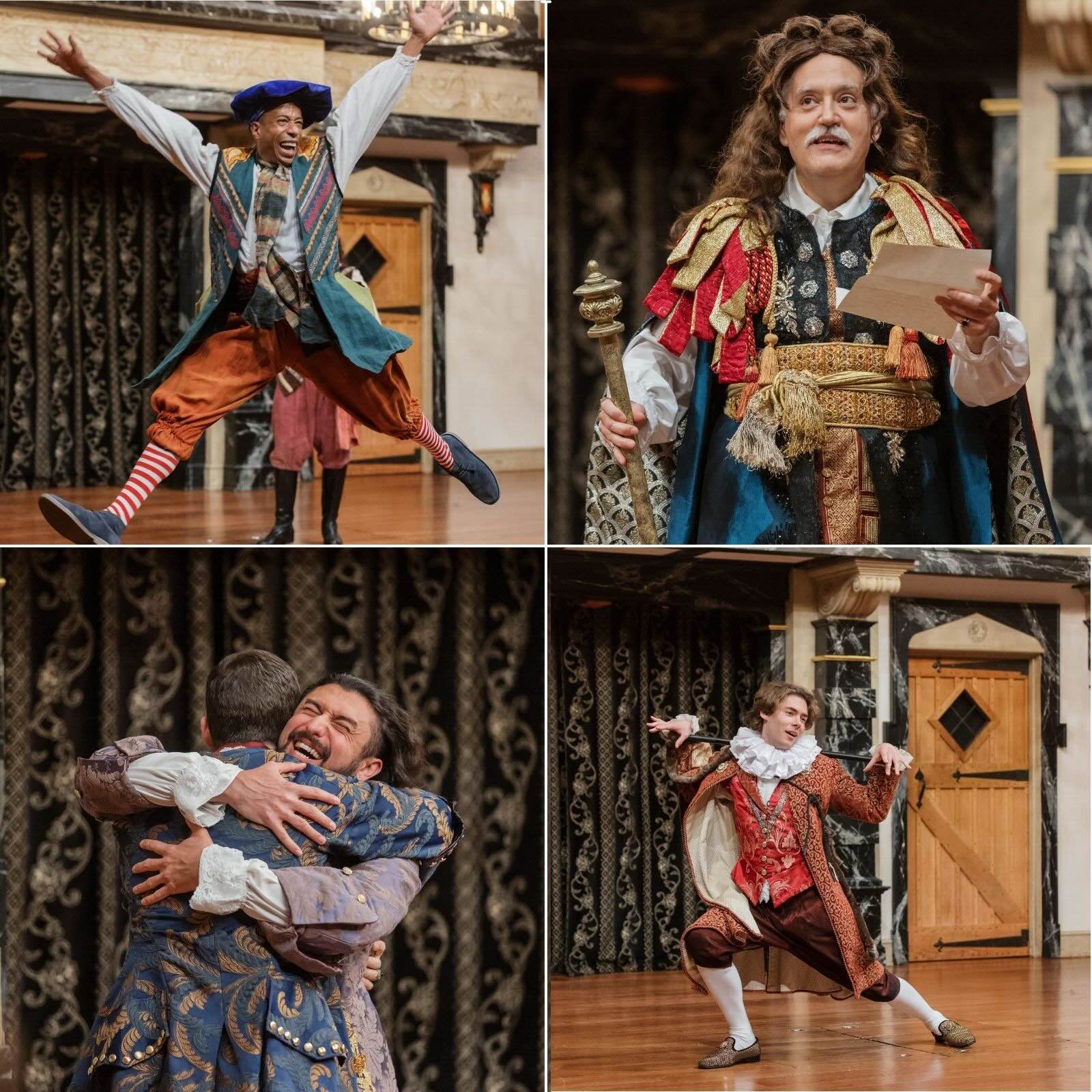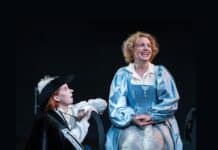It is one thing to read “Dog bites man,” and somewhat of a curiosity to read “Man bites dog.”
But in the annals of the stage, it is rarer — an epochal event, in fact — to read “Man upstages dog.”
Shakespeare aficionados know all about this centuries-long battle between dog and man onstage, the eternal struggle for attention between a charmingly clueless pup named Crab (the Elizabethan equivalent of Rex or Fido?) and his utterly doomed owner, Launce, in The Two Gentlemen of Verona.

Launce, you see, is the servant of a feckless dude by the name of Proteus, and he has just been ordered to leave hearth and home in Verona to travel with his master to the big city of Milan. As Launce recounts his tearful departure — mom, dad, heck, even the cat drops a tear — he turns to Crab repeatedly for any sign of empathy only to find, well, a perfectly pleasant, indeed blissed-out, Zen of a dog who shows no emotion whatsoever.
And we in the audience, of course, have no sympathy for Launce whatsoever; after all, it was bone stupid to bring the dog onstage to begin with, all eyes will be on Crab for the duration.
Or so we thought…
There is, actually, a storyline built around this dog show, which I’ll get to in a minute; but first we must doff our caps to Geoffrey Warren Barnes II, whose charismatic turn as Launce manages the seemingly impossible feat of drawing focus away from Lady, the lovable mutt who often plays Crab’s role, and who would rather go paws-up in your lap than pay any attention whatsoever to Barnes. It is a signal achievement, peak-career stuff, to see anyone top this dog; the comedic chops required, the impeccable sense of timing, the ability to play along with the most impossible of scene partners, are golden.
What makes this canine spectacle even more charming is that the American Shakespeare Center is partnering with two local rescue organizations, the Friends of Staunton Augusta Waynesboro Animal Shelter ( https://friendsofsawas.org/ ) and the Augusta Regional SPCA (https://arspca.org/) to help find forever homes for Lady and her mates back at the shelter. There’s a nice display in the upstairs lobby, and numerous opportunities to interact with Lady both during and after the show at each performance. A worthier cause is hard to think of.
So now back to the storyline, if you’re at all interested in stuff like that: We find ourselves with two Gentlemen (i.e., dudes with trust funds) named Valentine and Proteus, who will soon find themselves on the road from Verona to Milan, where the bright lights and big city await. Proteus leaves The Love of His Life behind (Julia), swapping rings and all that. But once in Milan, Proteus forgets all about that ring business and decides he would much rather plot against his BFF Valentine, in order to get Silvia (who is daughter of the Duke of Milan and Valentine’s true love, naturally).

Plots ensue and Valentine is driven out of town, where he falls in with an amiable band of gentlemen-outlaws (think: Pirates of Penzance, in Renaissance drag). Back in Milan, Proteus’ plot fails miserably, and it doesn’t help that Julia, disguised as a boy, and now in Milan herself, has witnessed his perfidy. As the finale plays out, and as Valentine and Proteus exchange accusations and forgiveness, we’re left with the same two dudes alone onstage, and we have to wonder how on earth they’re going to get out of trouble with their respective mates, because it’s obvious to Julia and Silvia (not to mention the audience) that neither of them is an especially good catch.
Valentine and Proteus, in other words, end up in the dog house. (Sorry, couldn’t resist)
As Valentine, we have Joe Mucciolo, who has such a fine turn as the malevolent Tybalt in this fall’s Romeo and Juliet, but here he turns into a seemingly able suitor, calm and dignified, handy with a rapier, in fun or in earnest. And it’s a sign of the ASC’s deep bench that for the performance I just watched, understudy Pete Sheldon nails it as the duplicitous, scheming Proteus. Given the interactive nature of Blackfriars, when Proteus reveals his dastardly plans, he is met with a chorus of boos and hisses — which Sheldon takes in stride, almost as a compliment. Very nicely done indeed.
Directing this production is ASC veteran Aidan O’Reilly, who expands remarkably beyond his acting work, thanks to ASC’s Artists Development Initiative. Given his track record on the boards at Blackfriars (his Petruchio looms large in my mind), he’s an excellent fit for mining the comic potential of this play. There is much else to delight in here, in particular when contrasted with the other characters they play in the ASC’s fall repertory. As Proteus’ hometown sweetheart, Sara Linares’ Julia is joyful, and is as demure and self-respecting here as she is boisterous and bawdy as Mercutio in Romeo and Juliet. Ditto Maya Danks, whose Sylvia is as reserved and self-respecting as her Nurse in Romeo and Juliet is earthy.

As Speed, Valentine’s servant, Isabel Lee Roden has a similar reversal of character; no sooner do we see them as the modest Juliet one night, than we see them as outspoken, and fully capable of making us laugh ourselves silly, here in Two Gents. The one throughline, so to speak, is Christopher Seiler as the Duke of Milan, who is fittingly naïve even as he makes a big show of his authority; he is as clueless as Juliet’s dad in R&J as well (dads generally get short shrift with the Bard — wonder why).
This being Milan, and Sylvia being the Duke’s daughter and therefore an excellent catch, even though Valentine has caught Julia’s eye, he’s got competition in the form of an impossibly vain and foppish Thurio — played in completely over-the-top fashion by Nick Ericksen. His Thurio is as ridiculous as his Romeo (in, you know, that other show in the rep) is earnest. The guy’s talent for physical comedy is obvious just standing there — seriously, he doesn’t have to say a word to have you in stitches with his attitude.
And lest we forget that Milan is the very heart and soul of the fashion industry, this production also features some stand-out costumes; Elizabeth Wislar astonishes the eye with her textured fabrics, nicely cut to advantage, and she also isn’t above having fun at the expense of one of the spear-carrier roles, putting Nick Ericksen in a robe that fully matches the upstage curtain, creating the ever-popular “blends with the scenery” effect.
The pre-show and intermission tunes are a great fit, golden oldies all; there’s a touching tribute to the Turtles with “Happy Together,” led by Chris Seiler, and a girl-group tribute with Sara Linares leading her backup singers in a nicely-choreographed “Be My Baby.” Intermission, however, brings out the awesome showman Barnes as he proceeds to flirt with half the audience, singing Sam Cooke’s “You Send Me” (minus the dog this time), and Isabel Lee Roden rounds out in a tribute to Virginia’s own Patsy Cline with a heartfelt “She’s Got You.” Music Director Seiler has found a way to pinpoint songs that can serve an overarching theme, and Cline’s ballad works nicely at several points in the second act here.
As the title suggests, this comedy makes an interesting pairing with the tragic events of this ASC’s rep partner, Romeo and Juliet – in fact, Friar Lawrence gets mentioned here as if he were just down the block — and if you look closely, you just might see him for a split second! So you can think of this romantic comedy as R&J’s inverse, with intrigues of an amorous kind, but one in which the ending (thankfully) doesn’t involve a body count.
One last note, and a preview of coming attractions: If you like the lovable outlaws in Two Gentlemen of Verona, you’re gonna love the crowning production of this fall’s repertory, The Pirate Ballad of Bonny & Read, a new musical play based on the true story of two accomplished women who ruled the high seas.
What are you waiting for?
Running Time: Two hours and 15 minutes, including one intermission.
The Two Gentlemen of Verona plays to November 15, 2025, in repertory with Romeo and Juliet (to November 15) and the world premiere of The Pirate Ballad of Bonny and Read 2025 (October 16 to November 16) presented by American Shakespeare Center at the Blackfriars Playhouse, 10 South Market Street, Staunton, VA. For tickets (starting at $39), call the box office at (540) 851-3400 or purchase them online. ASC also offers a Local Rush deal of 50% off tickets on Wednesdays and Thursdays. Learn more here.
Cast and artistic team credits for Two Gentlemen of Verona are online here.
The fall season program is online here.
SEE ALSO:
‘Romeo and Juliet’ as endearing tweens at American Shakespeare Center (review by Andrew Walker White, September 11, 2025)




